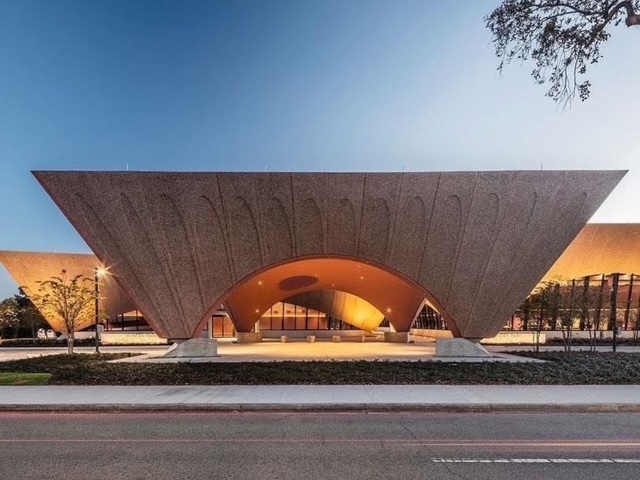
by Beth Kassab | Jul 11, 2025 | City Commission, Library, News, Uncategorized
Winter Park has a Long List of Complaints over Library and Events Center Construction
City officials and the contractor are meeting to try to resolve the problems
July 11, 2025
By Beth Kassab
Note: This story has been updated to include a statement from the contractor received on Saturday.
During the nearly four years since the more than $42 million Library and Events Center opened, Winter Park officials have compiled a list of what they say are construction concerns such as fracturing glass in some of the large panoramic windows, roof leaks, problems with the elevator and even the port-cochere, the grand covered entrance to the structure.
City Manager Randy Knight recently told the City Commission that the city is frequently meeting with representatives from contractor Brasfield & Gorrie to resolve the problems.
“Right now, we think they are going to resolve these issues,” Knight said. “But we’re going to go ahead and preserve our rights” before the statute of limitations runs out on filing a lawsuit over the claims.
This week the city notified the construction company and insurers of what it considers to be a “default” on the job to preserve the city’s right to sue if the problems aren’t fixed.
A spokeswoman for Brasfield & Gorrie, a national construction firm with offices in eight states that reported $6.4 billion in revenues last year, confirmed on Saturday that the firm is in talks with the city.
“We are discussing the city’s concerns and seeking resolution,” said a statement from the company.
Voters narrowly approved a bond referendum for $30 million in 2016 to pay for the project designed by British architect David Adjaye. Then, in 2020, the City Commission approved spending $41.7 million on the project. But, so far, the final tally is even higher at $42.3 million after the city added another $300,000 in 2022 from the American Rescue Plan Act, the federal stimulus package spurred by the pandemic.
The letter to the contractor lists 12 items that “has not been performed per plans and specifications” from the doors, lighting, air-conditioning and even the bathroom faucets along with the doors, windows, roof leaks and other concerns.
City spokeswoman Clarissa Howard said on Friday the contractor is continuing to meet with the city and working to resolve the matter.
WinterParkVoiceEditor@gmail.com
To comment or read comments from others, click here →
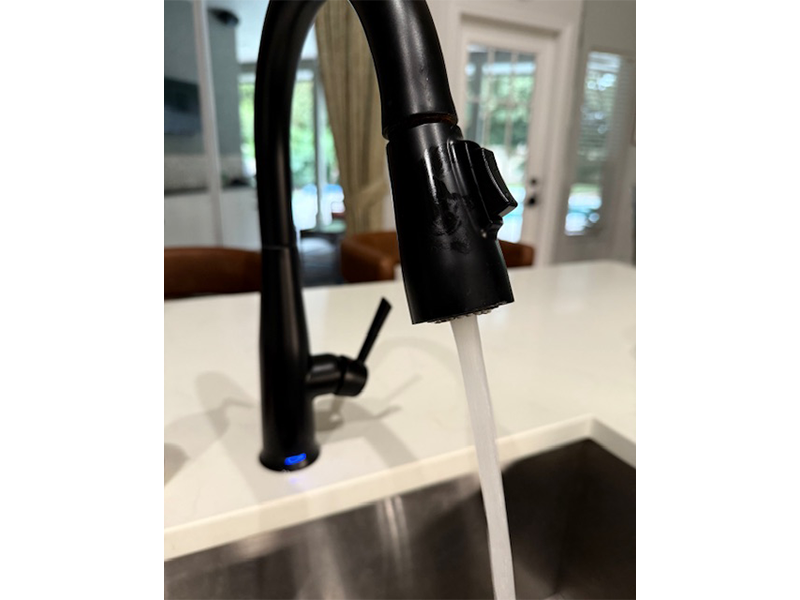
by Beth Kassab | Jul 10, 2025 | City Commission, News, Uncategorized
City Says the Problem Causing Smelly Water is Now Resolved
But the odor caused after lightning struck a water treatment plant could linger a few more days. Plus, state budget wins for Winter Park projects
July 10, 2025
By Beth Kassab
Residents complaining of a strong sulfur smell coming from their faucets in recent weeks got some good news on Thursday: The damage likely caused by a lightning strike to the ozone generator at one of the city’s water treatment plants appears to be resolved though the odoriferous problem may continue for a few days.
City Hall posted the update on Thursday afternoon after complaints about the smell and lack of information about it surfaced publicly at the City Commission meeting on Wednesday.
A power surge during a lightning storm hit the water treatment plant, one of three that supplies water to residents, on June 27 and city staff has been working ever since to bring the machine that oxidizes the city’s water to help purify it and reduce the rotten egg smelling sulfur often associated with Florida groundwater.
The water is safe to drink and the output from the damaged plant was reduced and treated with additional chlorine while repairs were underway, City Manager Randy Knight said.
“Twelve days of sulfur smell is a lot,” Cathy Baumgardner, who lives just north of Howell Branch Road, told the commission on Wednesday. “That’s not the big issue. The big issue is the lack of communication. Nobody contacted us … we didn’t know it was healthy until we called and asked.”
David Zusi, director of Water and Wastewater Utilities, said the water plants had withstood lightning strikes before but never one so severe that a portion of the treatment system was offline for so long. He said a number of experts, including the manufacturer of the ozone generator, which removes hydrogen sulfide from the water, were called in to help resolve the problem.
“This issue was extremely difficult to diagnose because no fault code was generated within the system,” the official update read. “Please note it may take a few days for the water with elevated hydrogen sulfide to flow out of the distribution system before it returns to normal odorless water.”
City to get $800k in project dollars from state
At at time when local governments are scrapping for every dollar from Tallahassee, Winter Park officials said this week that three projects requests made it into Gov. DeSantis’ final budget, escaping the veto pen.
DeSantis signed the $117.4 billion budget last week after cutting $567 million in line-item vetos.
- The largest score is $500,000 to replace the bridge on Stirling Avenue over Howell Creek. The 70-year-old bridge will be replaced, including drainage for surface water, sidewalks and railings over the bridge.
- The city will also receive $250,000 to dredge Lake Lillian at Mead Gardens.
- And $62,500 will go toward bollards or sturdy posts that act as a barrier between pedestrians at events and vehicles.
WinterParkVoiceEditor@gmail.com
To comment or read comments from others, click here →
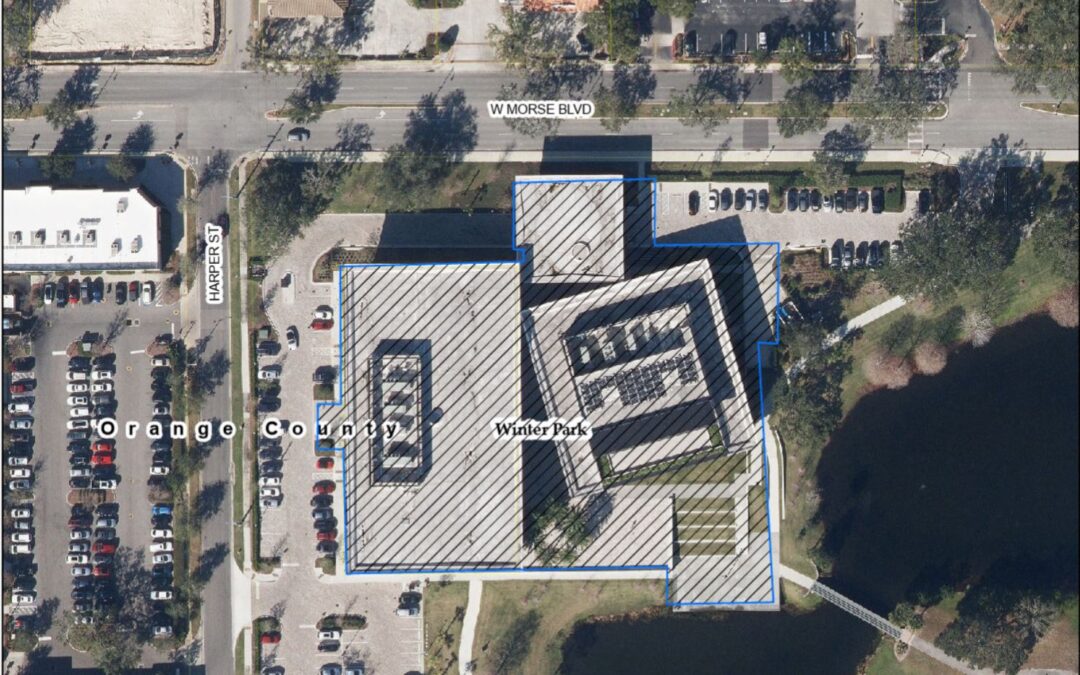
by Beth Kassab | Jul 10, 2025 | City Commission, Library, News, Uncategorized
Winter Park Approves Limits on Protests and Activity at Library and Events Center
In a split vote, the City Commission approved a new ordinance that they claim is based on complaints over photo shoots and one small protest at the public buildings
July 10, 2025
By Beth Kassab
The Winter Park City Commission on Wednesday voted 3-2 to approve an ordnance that draws a boundary around the Library and Events Center as essentially a new “no protest” or gathering zone.
Mayor Sheila DeCiccio and commissioners Craig Russell and Kris Cruzada voted in favor of the ordinance. Commissioners Warren Lindsey and Marty Sullivan voiced strong objections to the change and voted against it.
DeCiccio and city staff say the ordinance is needed to protect groups and individuals who rent space in the buildings for weddings, corporate meetings and other events from disruptions from people who may want to stage protests or use the $41 million complex’s unique architecture as a backdrop for extensive photo shoots or other gatherings.
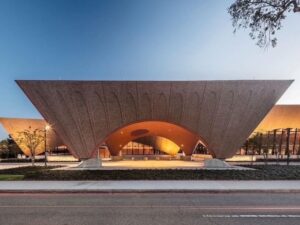
The Winter Park Events Center opened in late 2021 and was designed by British architect David Adjaye.
The new “no protest” area — the blue line drawn around the complex in the image above — mostly hugs the outline of the buildings, but also includes a large amount of outdoor space on the southeast corner of the building, which has large windows looking out onto Martin Luther King Jr. Park.
Lindsey, a criminal defense attorney, noted the irony of the city imposing what he views as First Amendment restrictions on the same week Winter Park plans to dedicate its commissioned larger-than-life bronze statue of King at an installation in the park known as Unity Corner.
“I think it’s interesting that this coming up Saturday we are going to be dedicating the statue … probably within 200 or 300 yards of the restricted areas,” he said, noting that the monument includes the words “courage is the power of the mind to overcome fear.” “I think a lot of times there a temptation that because we’re fearful of something we will overreact and Martin Luther King Jr. provided us instruction on that.”
He called the ordinance an “unnecessary use of government power.”
“We should be very, very careful how we use our power, especially how we use our police power,” he said. “And the only real argument for passing this thing is to deal with a hypothetical problem that has not occurred … that is something we should be very careful about doing.”
A list of 15 “disturbances” since the beginning of this year provided by the city is not enough justification for the ordinance, Lindsey and Sullivan argued. Of those, 10 are described as “photo shoot with props” or “prom photos.” One noted a “changing booth” and “lights.”
The other disturbances were listed as “cars blocking traffic” or “skateboarding/rollerblading/scooter.” Only one was listed as “group with signs” or anything resembling a demonstration or a protest.
A police dispatch call log noted someone called police just after 6 p.m. on May 15 to report “6-7 people outside on the south side near the lake, holding up signs protesting.”
About the same time the police arrived, the caller called back to report “her boss says they are allowed to be there.”
At the time, the events center was being rented by the Orlando Lawyers Chapter of the Federalist Society for an event featuring Josh Blackman, who was recently appointed by President Donald Trump to the Religious Liberty Commission’s advisory board of legal experts. Blackman is a constitutional law professor at South Texas College of Law Houston.
Winter Park attorney Michael Sasso is the president of the Orlando chapter.
Sullivan said people should be required to pull permits for elaborate photo shoots and that there are laws on the books already to address cars blocking traffic or disorderly conduct. But the kind of demonstration that occured on May 15 should not be limited.
“I have it from a reliable source there were four people at 5:30 in the afternoon standing there with small signs,” he said. “To me, that should be an allowable public gathering and that in my mind illustrates how this [ordinance] goes beyond what is needed … this prohibits activities that in my mind are permitted First Amendment activities.
City Attorney Daniel Langley argued that the city is allowed to put more restrictions on the library and events center because it’s not “traditional public forum” because it’s rented out and used by other entities.
He said that perimeter is drawn tightly around the buildings and, in many cases, “they could move two feet into the parking lot and continue that activity.”
The ordinance calls for a warning to be issued before people are trespassed from the area and potentially given a fine.
Commissioner Craig Russell said he is in favor of the ordinance because it’s about safety and protecting the space for those renting the venue.
“… We’re also not trying to recreate Tiananmen Square either as a city, so I think this is a very reasonable measure,” he said, referring to the 1989 crackdown on protests by the Chinese government. “Out of all the green spaces we have in the city, why there? It’s a unique space and we have the responsibility to protect it … I truly believe it’s not about stifling rights or anything of that nature.”
DeCiccio, also an attorney, cited a U.S. Supreme Court case over a municipal bandshell that she said allows the city to put restrictions in place.
She said the ordinances “does not silence voices,” but sets aside a “relatively small area” to be protected from potential disruptions.
WinterParkVoiceEditor@gmail.com
To comment or read comments from others, click here →
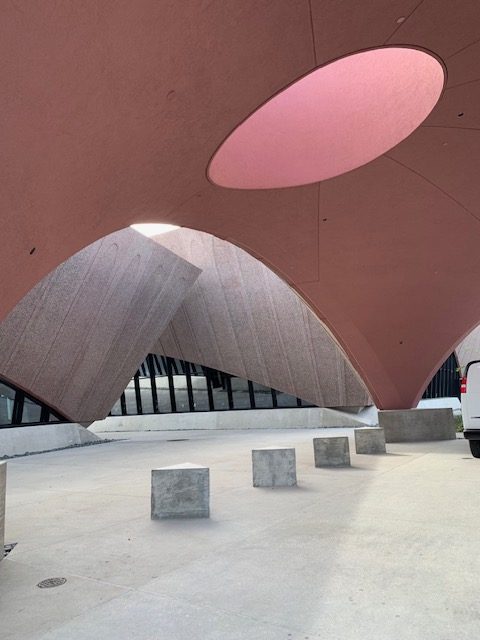
by Beth Kassab | Jul 8, 2025 | Arts and Culture, City Commission, Library, News
What Sparked Proposed Protest Ban at Library & Events Center? Mostly photo shoots
Records show photo shoots account for most of the reported disruptions at the Library and Events Center, a popular TikTok backdrop with its sharp angles and vaulted rooflines
July 8, 2025
By Beth Kassab
Winter Park ordered up a spectacle with a more than $41 million Library & Events Center by British architect David Adjaye featuring rose-tinted concrete of sweeping angles and a complex of vaulted pavilions.

The Winter Park Events Center. Photo courtesy of the city of Winter Park.
And that’s exactly what it got based on the reasoning for a proposed new ordinance to limit protests and other gatherings at the public space that opened in late 2021 at Martin Luther King Jr. Park.
“Because of current unrest that is being experienced around the country as well as recent event-related interruptions that have been reported at the Library and Events Center, the city felt this ordinance was necessary,” City spokeswoman Clarissa Howard said in an email. “The Library and Events Center has become a very popular rental venue for weddings, reunions, and other special events. It also architecturally lends itself to serve as a beautiful backdrop for professional and amateur photographers and all types of video productions/recordings. This ordinance would clearly outline the areas in which these types of activities can co-exist balancing public safety and free speech. It is a proactive measure to prevent potential hazards to pedestrian and vehicular traffic.”
A list provided by Howard includes 15 “disturbances” since the beginning of this year. Of those, 10 are described as “photo shoot with props” or “prom photos.” One noted a “changing booth” and “lights.”
The other disturbances were listed as “cars blocking traffic” or “skateboarding/rollerblading/scooter.” Only one was listed as “group with signs” or anything resembling a demonstration or a protest.
The city provided law enforcement call logs for some of the incidents. No one was cited or arrested and the logs appear to indicate the person who called in the complaint dropped the matter or the people or vehicles who were the subject of the complaints moved or left the area when asked.
A search of TikTok and Instagram posts tagged with the library or events center address yielded a handful of users posting photo shoots, wedding videos and other content.
After the first proposal was heavily criticized by two commissioners as potentially unconstitutional last month, the City Commission on Wednesday will consider a revised ordinance that includes a more narrow boundary around the buildings than first presented.
The revised version also includes a lower fine — from a maximum of $500 per day to $200 for the first infraction — for violations referred to Code Enforcement. The new wording also explicitly exempts political activities during elections, which is governed by state law — particularly because the library is a popular early voting site.
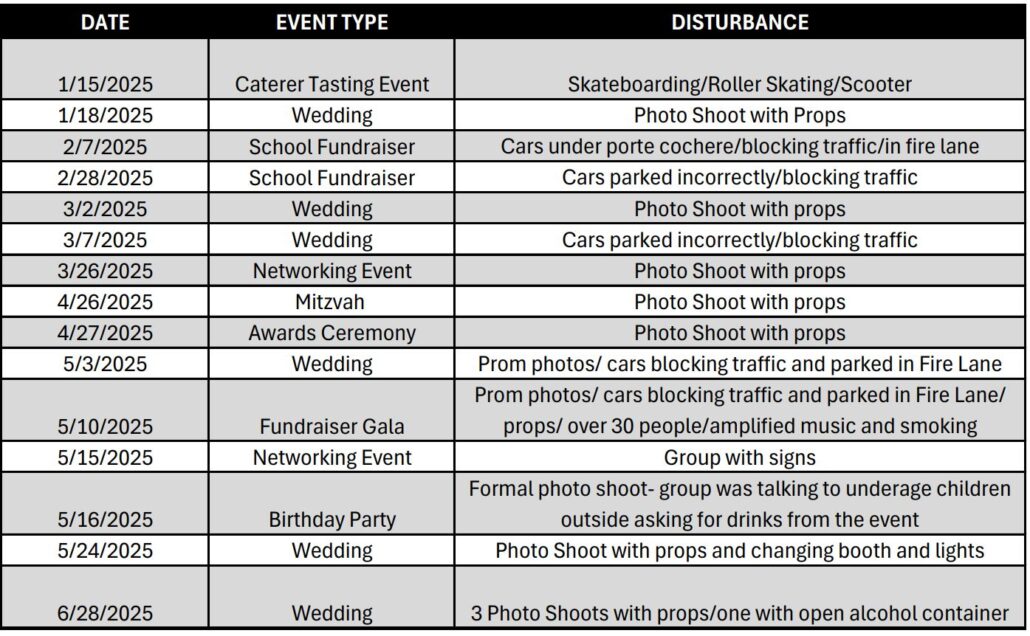
A list provided by the city of Winter Park shows disturbances logged at the Library and Events Center in 2025.
Commissioners Warren Lindsey and Marty Sullivan objected to the new rules last month, citing free speech and other concerns.
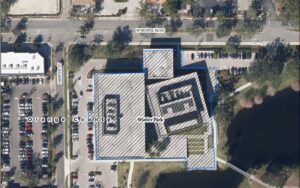
The blue line represents the new proposed boundary around the Library and Events Center to be considered this week.
“It’s not just just speech,” Lindsey said. “It’s also the right to assembly.”
He said the ordinance is a “solution looking for a problem” and that there are other rules on the books in Winter Park such as a noise ordinance and statutes against disorderly conduct that could apply to the concerns in question.
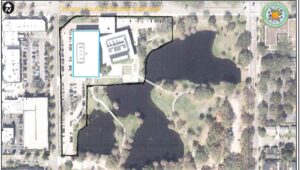
This image shows the original boundary drawn around the no-protest zone at the Library and Events Center considered on June 25.
All of the incidents on the list took place on a day or time while the Event Center, the city’s highest money-maker when it comes to venue rentals, was rented for a wedding, fundraiser or other private event.
The venue brings in $650,000 to $700,000 each year, according to the city budget. There have been 165 events through May at the venue, mostly for weddings and non-profit or corporate events. Repeat clients include Orlando Health, AdventHealth, the League of Women Voters and City Year Orlando, the budget stated.
WinterParkVoiceEditor@gmail.com
To comment or read comments from others, click here →
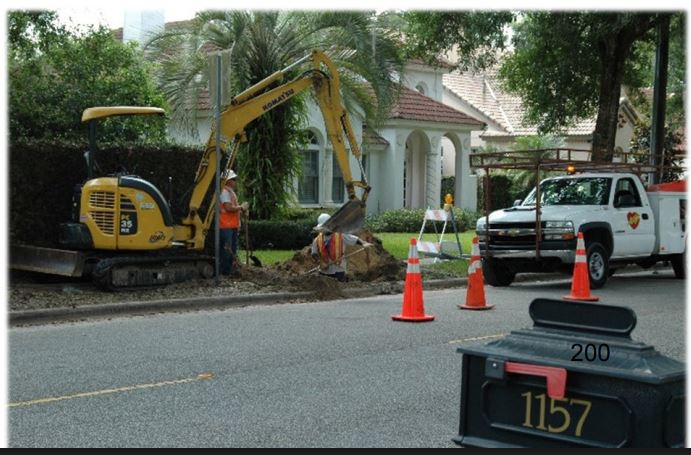
by Beth Kassab | Jul 7, 2025 | City Commission, News, Police
Residents face higher electric and water rates in new proposed budget
The draft $233.5 million city spending plan represents a nearly 9% increase over last year
July 7, 2025
By Beth Kassab
Winter Park residents will start to pay higher electric and water bills later this year if higher rates proposed in the 2026 budget are approved by the City Commission.
The Commission will begin on Wednesday to consider the draft budget for $233.5 million across all funds, an 8.9% or $19 million increase over this year amid widespread uncertainty about the national economic outlook and signs of slowing growth.
About half of the city’s budget increase is driven by the cost of undergrounding electric wires — a popular multi-year project that cuts down on outages — and other improvements to the city’s water and wastewater systems, which prompted staff to push for increases in the rates that utility customers will pay.
This year the city celebrated the 20th anniversary of its acquisition of the electric utility from the former Progress Energy, now Duke Energy, in a landmark deal that promised better reliability and lower rates.
Winter Park, which has about 30,000 residents, often boasts of providing customers with one of the lowest electric bills in the state .Over the most recent 12-month period, the city’s rates were about 10% below the average for municipal-owned utilities in Florida and 33% below Duke Energy.
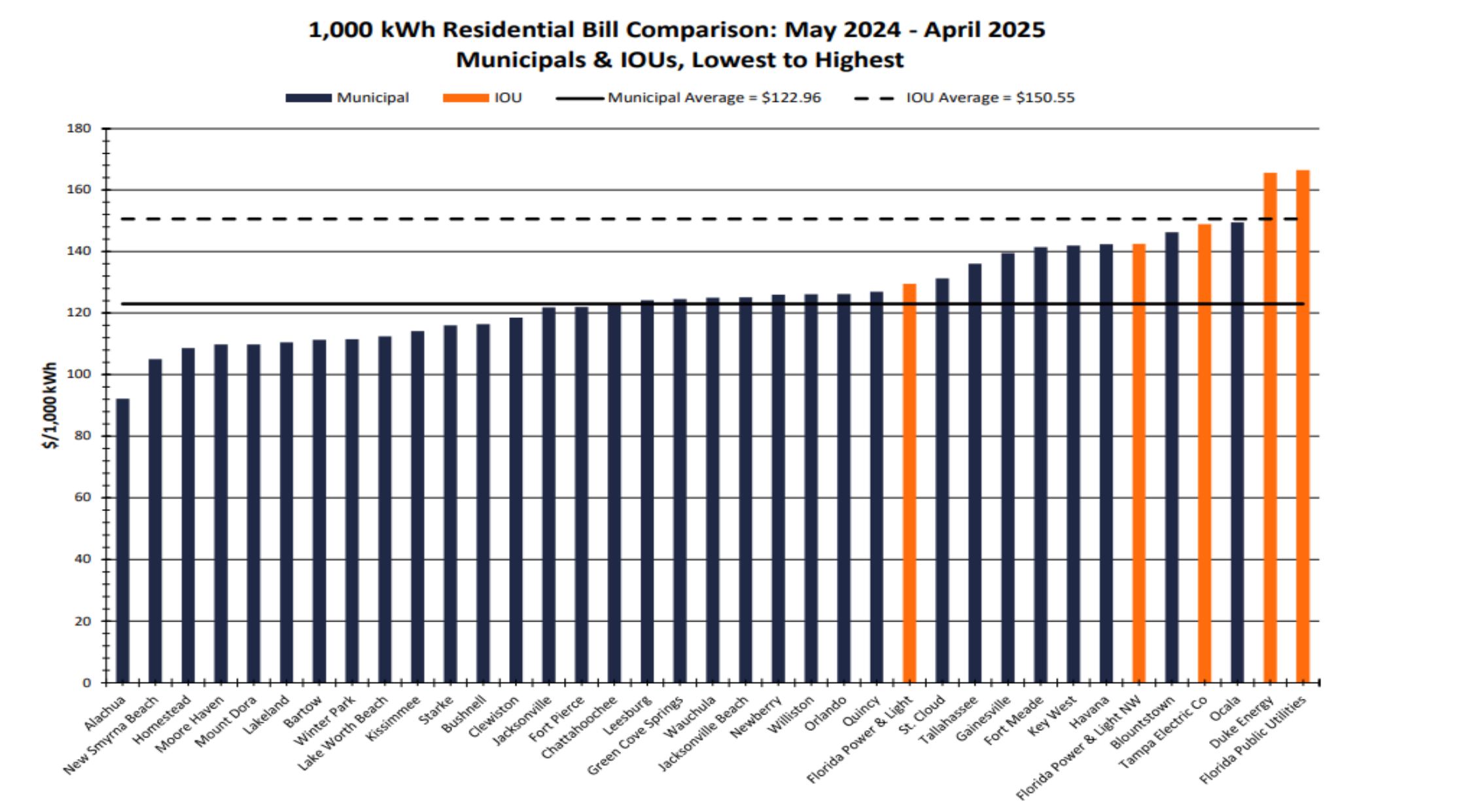
A chart from the draft 2026 budget proposal shows how Winter Park’s electric rates compare across the state. Above image: A crew from the city’s electric utility works outside of a resident’s home. (Photo courtesy of Winter Park Budget Proposal)
But the cost of the undergrounding project, which is now set to be complete by 2030, on top of persistent inflation means expenses are outpacing the current rate structure and, as the proposal noted, “the ability to continue to hold rates but still provide safe and reliable electricity has ended.”
The proposal calls for a 10% increase or about $15 more per month on a 1,000 kWh customer bill. The higher rates will fund the undergrounding project, substation and facility improvements and meter replacement, according to the budget document.
“While this is higher than would have been preferred, not having an annual index or policy for raising rates gradually leaves the utility with making periodic dramatic increases when outside shocks such as inflation and tariffs, affect the ability to maintain the current level of service,” reads the draft proposal. “It is actually surprising that the utility has not had to raise its non-fuel rates for years and is a testament to the extremely good power agreements and low-cost operation of the utility.”
Staff is proposing an additional 2% increase on water bills on top of the 2.23% increase set by the state Public Service Commission, which regulates utilities. The total adjustment would mean a $3.41 increase per month on the average 8,000 gallon customer.
The additional money would help the water utility keep up with capital expenses and stop using reserves to fund its obligations to help improve regional wastewater treatment plants.
Stormwater rates are also set to increase about $4 a month, according to the draft, based on a rate structure the City Commission put in place last year to increase rates by one penny per each property’s impervious square foot, each year, for three years. Those dollars go toward flood prevention, including setting into motion the results of recent basin studies, which identified the most urgent needs.
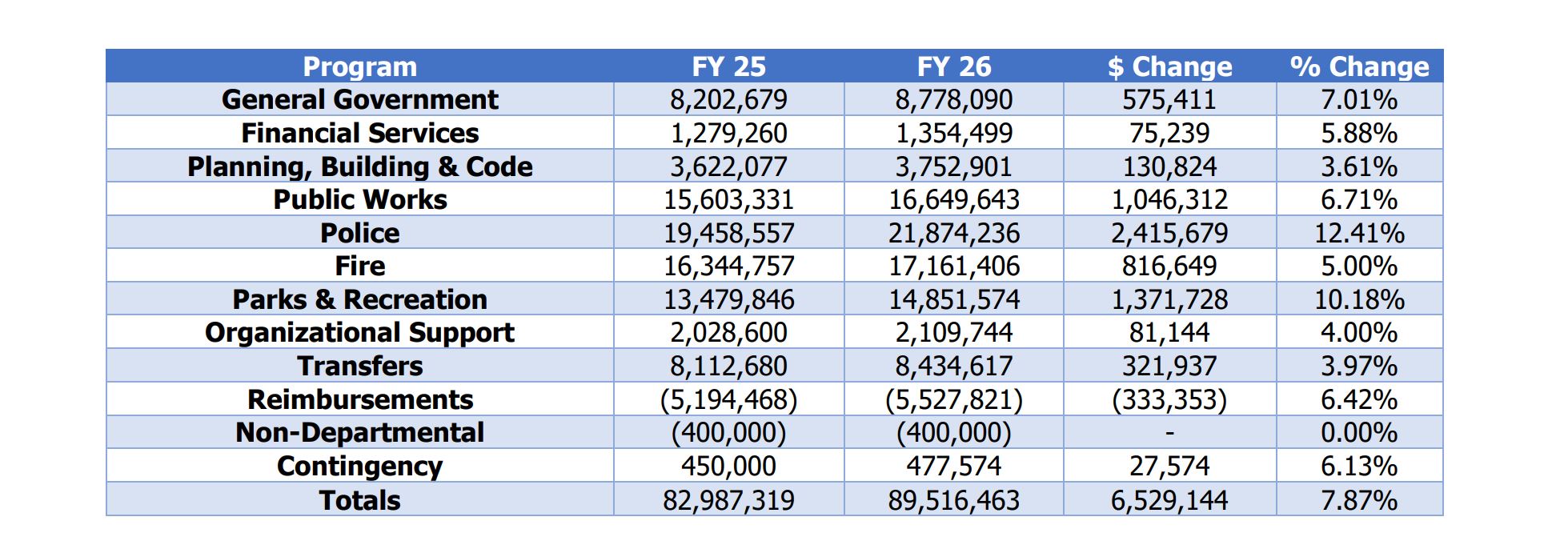
A chart from the draft proposal breaks down Winter Park’s General Fund, which makes up the largest portion of the city’s budget.
On top of those increases that will hit residents directly in the wallet each month, the budget proposal emphasized the need to balance an uncertain economic climate with political and other pressure to increase wages for police office officers.
“We are entering our 5th year of elevated inflation,” the budget draft states. “The long-vaunted U.S. economy is showing some concerning cracks as job growth is slowing, the number of home buyers vs home sellers has been dropping, retail sales are down, businesses have reduced hiring, creating the largest difference in unemployment between recent college graduates and the general workforce in years. All this points to a slowing economy that is likely going to remain at an elevated new normal of inflation around 3%. This means that the city will be experiencing slowing revenue growth while still facing an elevated inflation rate.
The draft noted that city governments often see a lag of about 18 months between signs of weakness in the economy and when the city begins to feel the downturn.
The budget keeps the city’s property tax rate the same — at 4.2991 mills, including debt service — though revenue will increase as property values increase. Each mill generates $1 for every $1,000 in the assessed value of a property.
“Property taxes are continuing to row the boat for the city’s fiscal picture, rising 7% and accounting for 44% of General Fund revenue,” the draft states. “This stabilizing force is what keeps most city services humming. Its rate of growth is sufficient to support the existing level of city services, but it is limited in what it can provide in excess of just staying on course.”
But even that steady revenue source is being threatened as Gov. Ron DeSantis and the Florida Legislature are looking to cut property taxes while putting pressure on local governments to increase police pay.
DeSantis announced proposed pay increases of 25% for state public safety workers, which pushing cities to set higher wages for their own police and fire personnel to stay competitive.
Winter Park plans to spend an additional $700,000 on public safety pay next year so that the starting salary for Winter Park police officers will reach about $65,000. At the same time, public safety pension costs will rise by $671,000.
Overall, the city employs 555 people and is budgeting for 2% cost of living raises plus an additional merit increase of up to 3%. The city is the fourth largest employer in Winter Park after AdventHealth, Orange County Schools and Rollins College. Publix rounds out the Top 5.
Other budget highlights include a warning that the capital improvement budget is tight and some projects may be deferred, particularly in the area of Parks & Recreation.
The current proposal calls for $885,000 for the following:
- $410,000 for ball tracking technology at the Winter Park Pines driving range and bunker improvements at the Winter Park Nine
- $200,000 through a grant application to replace eight hard courts at the Tennis Center
- $75,000 for LED lighting at athletic fields and tennis courts
- $150,000 for the landscaping office
- $50,000 for general parks maintenance
“The ability to fund new capital projects and priorities is diminished and doing anything new outside of identifying new revenue sources or grant opportunities will be difficult without cutting other services,” the proposal stated. “City services are only as reliable as the people, equipment, and infrastructure that deliver them.”
The city also expects its reserve funds to decline when measured as a percent of reoccurring expenses in the General Fund. Winter Park officials have stated their goal is to maintain reserves equal to about 30% of those costs and have reached that in recent years.
The new budget proposes $478,000 in contingency funds, which would bring the total reserves to about $22.3 million by the end of 2026, or about 26% of expenses. It would take another $3.6 million in savings to get to the 30% mark.
“It should be noted that even though the percentage is slipping, the total balance in the reserves is increasing,” the draft said.
Wednesday will kick off budget discussions in front of the City Commission. Time is set aside for public input on the budget during the City Commission meetings on Aug. 13 and Aug. 27. The first of the two required Commission votes on the budget is scheduled for Sept. 10.
WinterParkVoiceEditor@gmail.com
To comment or read comments from others, click here →












Recent Comments